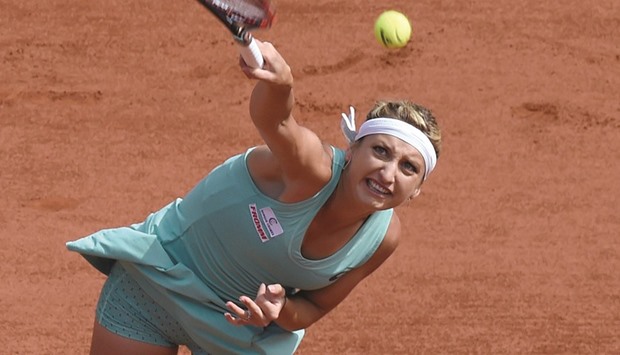Having once given up professional tennis to pursue a career in hotel management, Timea Bacsinszky is used to living in the shadows and the darkness suits her just fine.
The 26-year-old Swiss player’s run to the semi-finals at Roland Garros in 2015 was one of the tournament’s breakout stories. It came after a succession of injuries had pushed her world ranking down from the top 40 in 2010 to 285 by the end of 2013. But having rediscovered her love for the sport, Bacsinszky is in no hurry to endure the dizzying public exposure enjoyed by Roger Federer or even Stan Wawrinka, her better known compatriots.
“If people talk about me, that’s good. If nobody talks about me, you know, what’s the saying, I think in French we say, to live happily you have to live in the dark,” said Bacsinszky. “That’s good for me. I don’t want to always be in the spotlight.”
Bacsinszky has a reputation for being one of the deepest thinkers on the women’s tour. Where many of her contemporaries reach for tired platitudes, the world number nine admits she likes to study opponents up close, seeking weaknesses in every move.
“What happens on a tennis court is something that mirrors the person you are,” she said, after making the last-16 at Roland Garros for the second successive year yesterday with a straight sets win over France’s Pauline Parmentier.
“There are the little things that you can see in the locker rooms. If a girl folds her towels away and everything is clean and neat, if during a match you can break her game, maybe she’s going to be lost.”
The owner of four singles titles in her stop-start career, Bacsinszky certainly ticks all the PR boxes. She speaks French, Hungarian, English, German and Italian, all fluently. In her spare time, she relaxes by making jam, a talent inherited from her grandmother in Transylvania.
Despite her top-eight seeding, yesterday’’s match was only her third appearance on the showpiece Court Philippe Chatrier.
Ironically, Parmentier has been critical of the French media for what she describes as a lack of positive exposure in the national media for the women’s game. Parmentier, however, did concede that the men’s game “is more attractive”.
Bacsinszky belives it could be a losing battle to try and knock the likes of Federer, Wawrinka, Novak Djokovic and Rafael Nadal out of the headlines. “If there is less buzz, buzz, buzz about women’s tennis, I don’t know what the reason is. It’s been the case for years and years,” she said.
“So what’s the point in fighting and struggling and saying, Okay, we shouldn’t talk about women’s tennis this way. We should change —no, it’s a fact. Either you accept it or not.”

Switzerland’s Timea Bacsinszky serves during her win over France’s Pauline Parmentier in the third round match at the French Tennis Open in Paris yesterday. (AFP)
